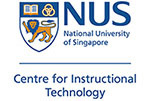 Dr Seow, please introduce yourself and your work in NUS.
Dr Seow, please introduce yourself and your work in NUS.
I am a Lecturer, on teaching track, at the Department of Biological Sciences, Faculty of Science. Currently, the modules I teach are LSM1301 General Biology, LSM1401 Fundamentals of Biochemistry, and LSM2202 Experimental Molecular and Cell Biology. As you are probably aware, all of the modules utilize IVLE heavily.
How do you characterize your teaching style?
I am not too sure how to characterize my teaching style. Basically, my main aim is to try to make sure that my students understand the subject matter and develop an interest in it so that they would want to find out more on their own. Besides that I would also like to see my students develop useful life skills (e.g. critical thinking and effective communications) and societal values (e.g. responsibility and integrity).
What role does technology play in education?
Technology should be used as a tool in education. There are so many possibilities that could be achieved using today's technology, and I am sure even more with tomorrow's technology, which were not available when I was a student.
Moving on, when and how did you get to know about IVLE?
When I started teaching as a Teaching Fellow in 2002, I was informed of the existence of IVLE.
What do you like about IVLE?
With IVLE, I don't need to go through the hassle of designing and setting-up a website to host the educational materials like lecture handouts, assignment worksheets, practical protocols, animations, etc. Furthermore, it also saves me the trouble of having to put up a box for completed assignments as I can use the Workbins to allow the students to submit their completed assignments online. The ability to set a deadline is very convenient too as it is very clear and objective. No problems with students coming a few minutes late and then begging to be given a chance. Having the students submit their assignments online is also great for the environment as I feel that we are cutting down too many trees already.
We understand that you use the Project and Multimedia tools. Tell us more about how you use them.
The Multimedia tool is used to put up the animations that I screen during lectures. This gives the students a chance to review the animations. The fact that they have to view it from the website also helps me to overcome copyright problems as the students don't have to download the original files to view the animations.
As for the Project tool, I am afraid to say that I do not use it to mount projects at all. Instead I use it too set up groupings for the class as the Class Management tool will restrict one group to one student only. This is because I have different groupings for tutorial and practical classes.
How else do you incorporate IVLE into your teaching?
I use the IVLE Forum to allow the students to post their queries. This is my preferred method as the classes I teach usually have very large enrolments, and if the students send their questions to me directly, I often end up answering the same questions posed by different students. The Announcement tool (with SMS option) is used to make urgent announcements and send reminders of deadlines to students. I try my best to keep the messages within 160 characters to enable me to have the announcements delivered to their mobile phones as well. I also use the Chat Room during the Revision Week and a few days before the exam to attend to queries from the students on a real time basis.
What is your students' response to your IVLE usage?
Although there are many positive comments, there are also negative ones. The students generally liked the fact that the animations, references, announcements, and reminders are posted on IVLE. While many also liked the idea of electronic submission of assignments and posting of questions on the Forum, some were not too happy with the practices. The ones who were not too technically-savvy felt that online submission were too stressful, while others preferred me to answer their questions personally via e-mails. One of my students complimented my IVLE usage in a survey. The student said:
There should be a course teaching some of the lecturers to use IVLE as I feel that a lot of lecturers have not optimised IVLE's usage. Some only use it to deposit their notes but not as a means of communication. If only the lecturers can use it like Dr. Seow TK as he makes full use of IVLE for my LSM 1401 module. Highly commendable!
Are there any other educational technology tools that you use? If there are, what are they?
I use wires, a bingo-like games, stories, anecdotes, Internet websites, and whatever I can find that would help me to clarify and illustrate the concepts and principles that I teach.
Thank you, Dr Seow, for your time and candid responses!

 Mr Aaron Tan Tuck Choy, Lecturer,
Mr Aaron Tan Tuck Choy, Lecturer,  Dr Lim Kwang Hui is an Assistant Professor in the
Dr Lim Kwang Hui is an Assistant Professor in the 
 What do you like most about IVLE? Which features do you use?
What do you like most about IVLE? Which features do you use?